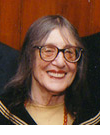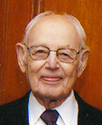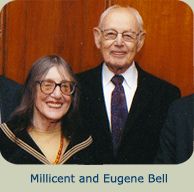

Founders
Biography of Millicent Bell (1919-2015)
 Dr. Millicent Bell was born Millicent Lang-Sissman in New York City. She majored in english at New York University and earned her masters degree and doctorate from Brown University. Dr. Bell then had a career in journalism and editing serving as a reporter for the Savannah Evening Press, the Toledo Blade and the Philadelphia Record and Time, Inc., and as an Associate Editor of Architectural Forum.
Dr. Millicent Bell was born Millicent Lang-Sissman in New York City. She majored in english at New York University and earned her masters degree and doctorate from Brown University. Dr. Bell then had a career in journalism and editing serving as a reporter for the Savannah Evening Press, the Toledo Blade and the Philadelphia Record and Time, Inc., and as an Associate Editor of Architectural Forum.
Dr. Bell is Professor of English Emerita at Boston University, a trustee of the Marine Biological Laboratory, in Falmouth, Massachusetts, and the author of a number of books including Marquand: An American Life, Hawthorne’s View of the Artist, Edith Wharton and Henry James: The Story of Their Friendship, Meaning in Henry James, and Shakespeare's Tragic Skepticism and the editor of The Cambridge Companion to Edith Wharton.
Dr. Bell has been widely honored for her works including a Howard Foundation Fellowship, the Shell Foundation award, a National Endowment for the Humanities Senior Fellowship, a Guggenheim Fellowship, the Winship Prize for Marquand, and a Fullbright Travel Grant to France. Marquand also was nominated for the National Book Award in biography and for the Pulitzer Prize.
Dr. Bell also has held a number of professional posts including President of the New England College English Association, President of the Hawthorne Society, Chair of the Pulitzer Prize Biography Jury, Member of the Editorial Board of the Henry James Review, and Member of the Editorial Board of the Complete Letters of Henry James.
Biography of Eugene Bell (1918 – 2007)
 Dr. Eugene Bell was born in New York City and grew up in the Bronx, graduating from DeWitt Clinton High School. He majored in math and physics at New York University. Dr. Bell interrupted his studies to volunteer for the Army during World War II, and served in the Pacific. He saw combat action in the Philippines and in New Guinea and was wounded by a piece of shrapnel that stayed in his hand for the rest of his life.
Dr. Eugene Bell was born in New York City and grew up in the Bronx, graduating from DeWitt Clinton High School. He majored in math and physics at New York University. Dr. Bell interrupted his studies to volunteer for the Army during World War II, and served in the Pacific. He saw combat action in the Philippines and in New Guinea and was wounded by a piece of shrapnel that stayed in his hand for the rest of his life.
Dr. Bell returned to New York University after the war and graduated in 1948. He received a master degree from the University of Rhode Island and a doctorate in biology from Brown University in 1954. Dr. Bell joined the faculty at the Massachusetts Institute of Technology in 1956 and become a professor of biology in 1967.
During the 1970’s, Dr. Bell made several hundred outstanding scientific films with the Boston Education Development Center. Ten of these films won awards at film festivals. The films were praised for their aesthetic as well as scientific quality and were used extensively in schools for many years.
Beginning in 1979, Dr. Bell experimented with skin cells in an effort to generate replacement tissue for treating severe burns and other injuries. He was able to implant a patient’s own skin cells in a matrix of collagen gel and grow “skin equivalents” that included both dermal and epidermal cells. Because the tissue was derived from the patients’ own cells, it did not set off an immune reaction and was not rejected by the body, and it was successfully used to treat patients. Dr. Bell reported these results in a widely cited article in the journal Science in 1981.
"He founded a whole field out of tissue engineering, namely out of taking basic cell biology and translating it into the clinic to help patients. He's known as the father of tissue engineering." - Dr. Gerald Weissmann, a research professor of medicine and director of the Biotechnology Study Center at New York University.
Dr. Bell retired from MIT in 1986 and founded Organogenesis, a Cambridge company to produce replacement skin, other tissue and wound-healing products and his designs of such materials were patented and produced industrially. He served as president, chief scientific officer, and board chairman of the company.
Dr. Bell then went on to founded TEI Biosciences Inc., a Boston scientific company that develops products for tissue repair and regeneration and, again, was responsible for new replacement designs. He served at different times as chief executive officer, president, chief science officer, and a board member.
He also was a research scientist and corporation member of the Marine Biological Laboratory in Woods Hole, Massachusetts.
In 2003, Dr. Bell received the Biotechnology Achievement of the Year Award from the New York University School of Medicine for his research. Dr. Bell held more than 40 U.S. and foreign patents and was the chief author of more than 200 scientific papers.





